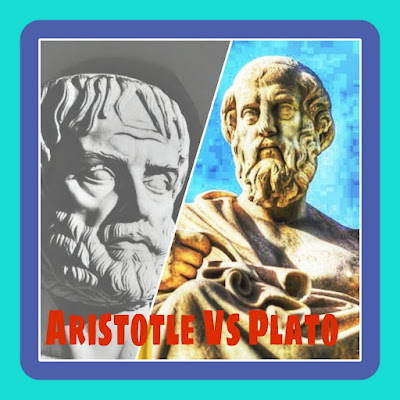Plato and aristotle similarities and differences | Plato is idealist but Aristotle is realist. Discuss.

Aristotle differs from Plato more in his style than the substance that he teaches in his political philosophy. Aristotle is a realist, and his theories provide clear concepts. Aristotle is universally regarded as the first Platonist, or the greatest of the Platonists. There is not the slightest doubt that all his philosophy is deeply rooted in that of Plato. There is hardly any of Aristotle’s leading thoughts which cannot be traced back to Plato and whose germ is not found in Plato’s dialogues.
It is true that Aristotle has interpreted Plato’s philosophy in his own way but it does not mean that Aristotelianism is entirely a violation of Platonism. It is also wrong to say that Plato is all utopianism and Aristotle all empiricism.
The main points of agreement between Plato and Aristotle may be explained thus:
- Both Plato and Aristotle regard the state as a natural and necessary institution. Both of them feel that good life is possible only in a state.
- Both of them build up an ideal state where justice shall prevail. Again, like Plato, Aristotle assigns political power to the best citizens.
- Both of them attach great value to education. Both of them feel that education plays great role in the moulding and shaping of a man’s character.
- Both of them are opposed to accumulation of private property. Although Aristotle rejects Plato’s communism of property as impracticable, he argues that property, while owned by individuals, should be utilised for the common good. Fundamentally, the voice is the voice of Plato.
- Like Plato, Aristotle also is an idealist to some extent. He is an idealist as he believes in ideas, norms and ends.
- Both Plato and Aristotle believe that man can develop his personality only as a member of society. Both realise that there can be no anti-thesis between the individual and the state.
- Both of them are concerned with the city-state. Both believe that city-state is a moral institution aiming at a good moral life of the citizen.
- Both regard ethics and politics as intimately linked. Both strongly plead the case of harmonious relationship between the two. 9. Both recognise the institution of slavery. Plato may be silent about slavery in The Republic, but in The Laws, he recognises slavery. Likewise, Aristotle openly defends slavery. 10. Both of them favour state interference in all aspects of life including even private matters of family life. Plato stands for censorship of art and literature. Aristotle too defends the state regulations relating to marriage and population.
Read also ARISTOTLE’S VIEWS ON DEMOCRACY
The main points of disagreement between Plato and Aristotle may be explained thus:
Indeed, Aristotle is heavily influenced by Platonic philosophy, and Aristotle is dependent on Plato. However, there are significant distinctions between Plato and Aristotle and Plato is an idealist and utopian thinker, and Aristotle is an analytical and natural scientist.
The most significant distinctions between Plato and Aristotle are as follows
- Aristotle is more individualistic than Plato, and Plato is concerned with both ethics and political issues in the same treatise. However, Aristotle is concerned with these topics in two separate treatises: Ethics and Politics.
- In contrast to Plato, Aristotle does not advocate emancipation for women, and Aristotle is a proponent of emphasizing the importance of family life. However, Plato believes that women should be serving the State in the same way as men do.
- Plato is a poet and artist through used words. Aristotle does not allow the political principles of his philosophy to be dictated by poetry, and he is not interested in the aesthetics of fashion.
- Platonic Ideal State differs from the one of Aristotle. In Aristotle’s view, the Ideal State is based on reality. It is possible to realize it in the world. However, Platonic Ideal State is a utopia, and it’s possible in the heavens and not on the earth.
- Plato has no passion for the facts; and however, Aristotle believes in scientific knowledge, and he is a believer in facts. In contrast to Aristotle, Plato believes in the world of senses that he sees as a realm of facts.
- Plato and Aristotle are different from one another regarding the law. In The Republic, Plato says that law is evil. Law shouldn’t be the sole rule of the State. In The Laws, Plato gives the importance of the law. In contrast, Aristotle is the defender of the law. Aristotle believes in the sovereignty of law. Law rules the supreme authority over all people and institutions within the United States.
- Aristotle does not believe in Plato’s conception of the State’s unity. Aristotle affirms that only unity can destroy the State’s essence, and it could make the State one family.
- Aristotle does not believe with Plato that philosophers should be the rulers. Aristotle believes that science-based knowledge cannot help philosophers become rulers as it doesn’t allow them to grasp the fundamentals that govern the human condition.
- Aristotle is very sceptical of Platonic communism, and Plato recommends communism of family and property to generals and warriors. It is essential to keep peace and harmony within the State. However, Aristotle believes that it will not be able to attain its goal. Aristotle believes that the State’s unity is possible to be maintained through the proper education system, not the communist ideology.
- Aristotle is a realist, and in his State, man has freedoms and rights. On the contrary, Plato considers himself an idealist, and Plato believes that man is not entitled to liberty.
Conclusion
Aristotle’s ideas are, thus, based on Plato’s philosophy. In fact, Aristotle has borrowed every idea and concept from Plato. Most critics have made much of criticism of Plato’s communism of family, but it is based on misinterpretation. Aristotle has, no doubt, criticised Plato’s communism of family and many other ideas on various grounds, but such criticisms do not reveal any fundamental disagreements between Plato and Aristotle.
